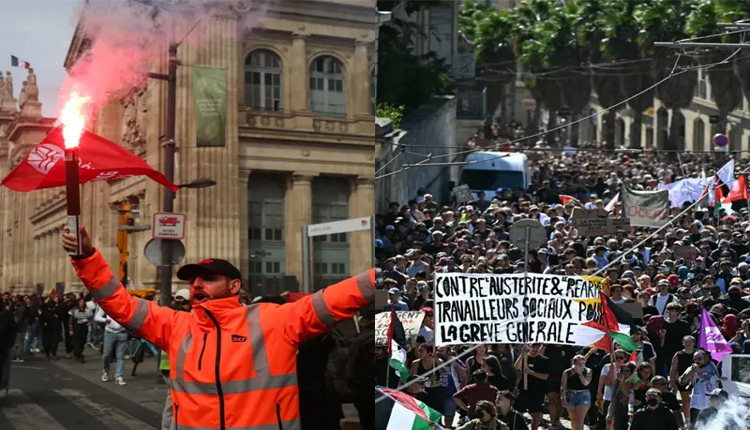Paris: France, the cradle of liberty and equality, is once again witnessing a surge of public fury that threatens to paralyse its bustling streets and institutions.
The ‘Block Everything’ movement has erupted across the nation, with protesters blocking roads, halting public transport, and disrupting schools, offices, and even hospitals.
This wave of unrest, reminiscent of the iconic Yellow Vests protests, stems from deep-seated frustrations with economic policies, social inequalities, and a political establishment perceived as out of touch. As strikes spread like wildfire, the government has ramped up police presence, but the flames of discontent show no signs of dying down.
The world watches closely, including India, with which France shares robust trade ties, wondering if this could mark a turning point in Europe’s most vibrant democracy.
At the heart of the turmoil is the ‘Block Everything’ campaign, a bold strategy by unions, students, and civil groups to grind the country to a standstill.
From Paris to Marseille, demonstrators have barricaded key routes, forcing commuters to abandon cars and trains alike. Educational institutions have shut down, leaving thousands of students on the streets, while healthcare workers join the fray, raising alarms about patient care. The movement’s goal is clear: to force the administration to address grievances that have simmered for years. “We cannot work under these conditions,” echoed a striking teacher in Lyon, capturing the collective exasperation.
As the protests intensify, questions arise about their trajectory — will they fizzle out like past agitations or evolve into something more transformative?
Delving deeper, seven critical factors fuel this nationwide backlash. First, the controversial pension reforms stand out: the government’s push to extend the retirement age from 62 to 64 has ignited outrage among workers who see it as a betrayal of their hard-earned rights.
The working class, already stretched thin, views this as yet another assault on their future security.
Second, the youth are at the forefront, battling skyrocketing university fees, a dire job market, rampant police brutality, and pervasive racial discrimination that alienates immigrant communities. Young voices chant for opportunities that seem perpetually elusive in a nation priding itself on meritocracy.
Third, trust in leadership has eroded sharply. President Emmanuel Macron, once hailed as a reformer, is now branded “the president of the rich” for policies that appear to favour corporations over the common folk. Rural areas and small towns feel particularly sidelined, their pleas drowned out by the glamour of urban centres. This mirrors the Yellow Vests uprising of 2018, born from fuel tax hikes that exacerbated living costs in the hinterlands.
Fourth, inflation and the rising cost of essentials — groceries, fuel, housing — have hit hard, especially outside big cities, where subsidies seem to bypass the needy.
Fifth, social fissures are widening. Debates on immigration, cultural identity, and France’s staunch secularism (laïcité) have turned toxic, with minorities facing systemic bias despite the republic’s foundational motto of “Liberté, Égalité, Fraternité”.
Sixth, political polarisation grips the spectrum: Macron’s centrism is squeezed between the far-right surge led by figures like Marine Le Pen and a resurgent left demanding radical change.
Finally, these protests aren’t isolated; they build on chronic issues like unemployment, inequality, and social insecurity that have plagued France for decades.
As a nation with a storied history of revolutions — from 1789 to May 1968 — France remains a laboratory for social experiments, but today’s unrest signals that basic expectations of dignity and fairness remain unfulfilled.
Amid the chaos, President Macron has taken decisive action by appointing a new Prime Minister from within his cabinet — the erstwhile Defence Minister — to steer the ship of state. This move, under France’s semi-presidential Fifth Republic framework established in 1958 by Charles de Gaulle, aims to inject fresh momentum into governance.
In this system, the President wields executive power over defence, foreign affairs, and crises, while the Prime Minister handles day-to-day administration, legislative agendas, and policy execution. The bicameral parliament, akin to India’s, features the powerful National Assembly — elected directly and capable of ousting the government — and the indirectly elected Senate.
Presidential elections, held every five years in two rounds for a majority mandate, underscore the system’s emphasis on stability. Yet, even this robust structure strains under public ire, as the new PM’s installation seeks to restore order without addressing root causes.
Intriguingly, parallels are drawn to Nepal’s recent upheavals, though the contexts diverge sharply. In Nepal, political volatility — frequent regime shifts, constitutional delays, and corruption — has bred disillusionment, culminating in military interventions. France, by contrast, boasts institutional resilience, but both nations grapple with a similar undercurrent of public anger against elite indifference. “Nepal and France hail from distinct historical and social milieus, yet the shape of citizen rage bears striking resemblances,” observers note.
While Nepal’s instability stems from parliamentary fractures, France’s stems from policy missteps in a stable democracy. Could this be France’s ‘Nepal moment’? Unlikely, given its democratic depth, but the unrest underscores a universal cry for equitable progress.
As the ‘Block Everything’ saga unfolds, France stands at a crossroads. Will Macron’s reforms prevail, or will the streets redefine the nation’s path? The coming weeks will tell, but one thing is certain: the spirit of protest that birthed modern Europe is alive and kicking.



Comments are closed.